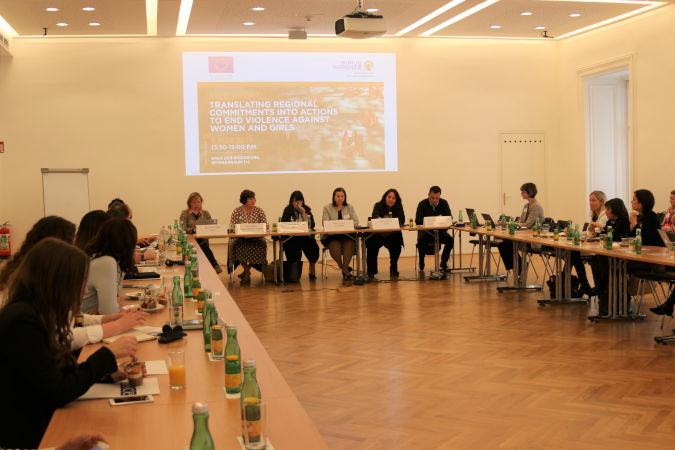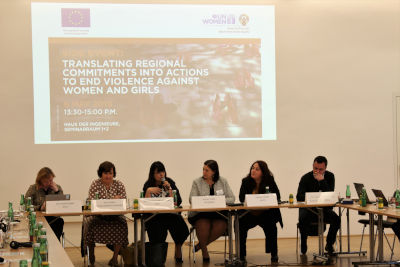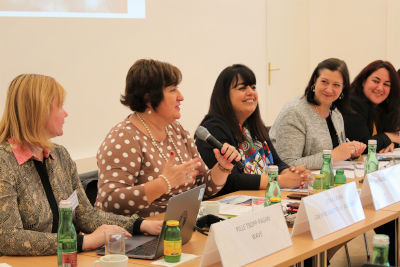High-level meeting urges effective enforcement of the Istanbul Convention to eradicate violence against women
Date:

On the sidelines of the OSCE Conference on combating violence against women and girls, high-level government, civil society and EU representatives gathered to urge for the ratification and effective enforcement of the Council of Europe Convention on preventing and combating violence against women and domestic violence, also known as the Istanbul Convention.
Organized by UN Women, on 6 May in Vienna, the side event “Translating regional commitments into actions to end violence against women and girls” took stock of progress and offer solutions for the effective enforcement of the Istanbul Convention and push its agenda forward by discussing concrete actions and measures that need to be taken at the national and regional levels by governments, regional institutions and civil society organizations.

“We operate in a context that completely failed to prevent acts of violence. This is a collective failure. We need a new political and operational approach, and men and women need to do this work together,” said Ambassador Mara Marinaki, European External Action Service (EEAS) Principal Adviser on Gender and the Implementation of the UN Security Council resolution 1325 on Women, Peace and Security.
“The Istanbul Convention is linked with the principles of ‘Leaving No One Behind’, which have to be integrated into policies and programmatic actions on eliminating violence against women and girls,” said Alia El-Yassir, UN Women Regional Director for Europe and Central Asia, who also moderated the discussion.
The Istanbul Convention is the first legally-binding instrument in preventing and combating violence against women and domestic violence at international level. Governments that have ratified the Convention are obliged to change their laws, introduce practical measures to prevent violence and support victims, and allocate resources to effectively prevent and combat violence against women and domestic violence.

“Since its entry into force in 2014, the Convention has contributed to saving hundreds of lives; served as a basis for the introduction of new criminal offences of forced marriage, stalking and female genital mutilation in several countries; led to the modification of law provisions concerning rape; and set high legislative and policy standards,” said Zita Gurmai, Member of the Hungarian National Assembly and the Parliamentary Assembly of the Council of Europe.
As the world marks five years since the Istanbul Convention entered into force, progress remains slow in fully eliminating violence against women and girls. There are new and continuing challenges impacting the effective enforcement of international commitments, including lack of criminalization of all forms of violence in national laws, re-emergence of patriarchal and stereotypical family values in many countries, and the serious shift from a human-right-based approach to conservative interpretations of norms.
“Approaches to address violence against women are more assistance-based than empowerment-based. A woman is a woman forever, not a victim forever,” emphasized Simona Lanzoni, Vice President of the Group of Experts on Actions against Violence against Women and Domestic Violence (GREVIO), highlighting the need for laws that are empowering.
Dusan Tomshikj, Special Advisor for social policies and protection of children at the Ministry of Labour and Social Policies of the Republic of North Macedonia, emphasized the political will to effectively address violence against women. After North Macedonia ratified the Istanbul Convention, he said that an Action Plan for its implementation from 2019 to 2023 was developed and adopted, with three core elements: harmonization of the legislation, improving the services and prevention. “For the first time, Ministry of Labour and Social Policy has budgeted funds to enhance service provision and support civil society organisations,” he said.
Participants highlighted the emergence of an overall backlash on women’s rights and gender equality, which also manifests itself strongly in discussions around the Istanbul Convention. Pille Tsopp-Pagan, President of Women Against Violence Europe Network (WAVE), highlighted the work that her organisation leads across Europe to advocate for women’s rights to address the strong backlash.
The Side Event was oganised in the framework of the EU-UN Women programme “Implementing Norms, Changing Minds,” aiming to end gender-based discrimination and violence against women in the Western Balkans and Turkey, with a focus on the most disadvantaged groups of women.